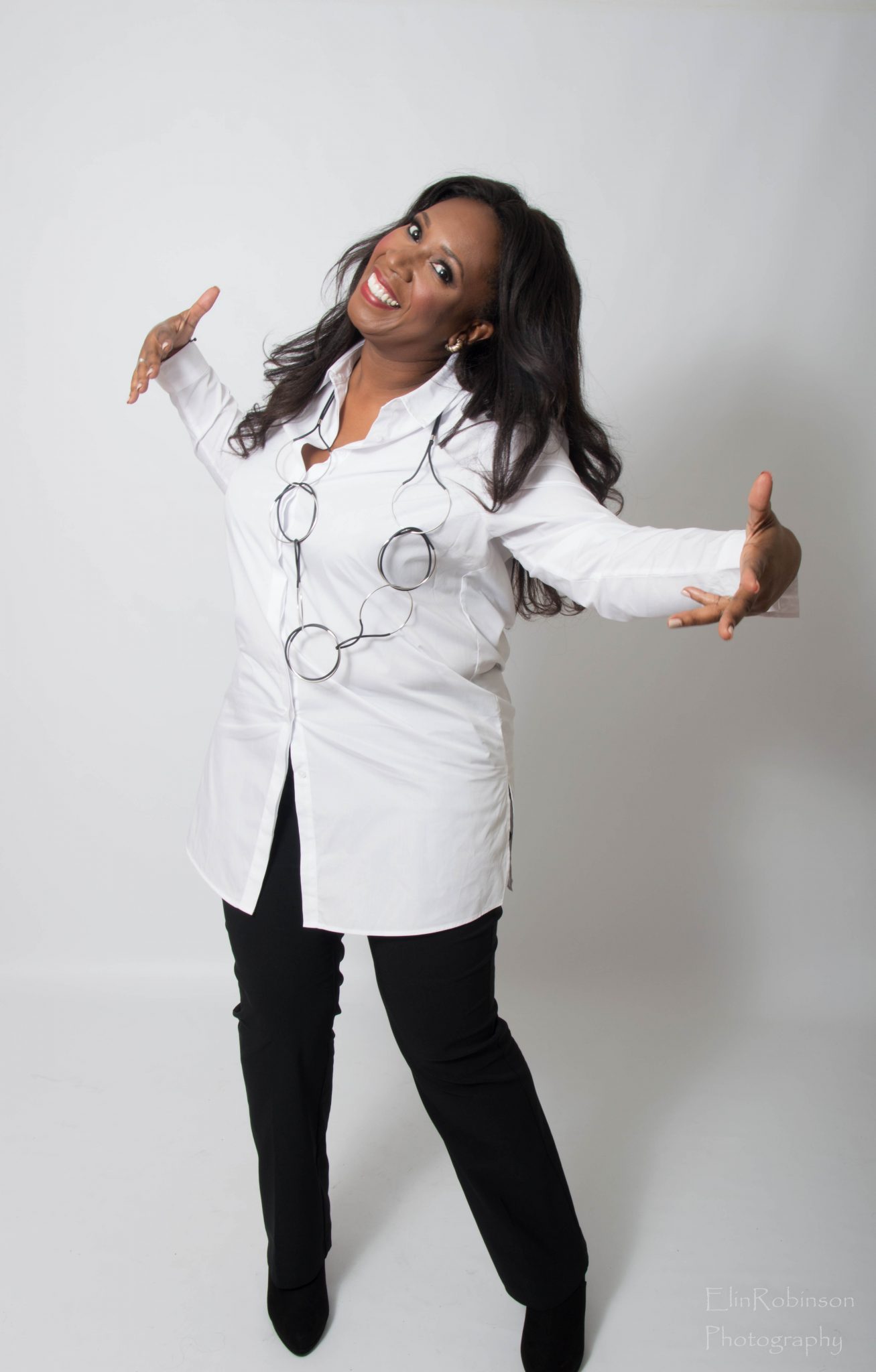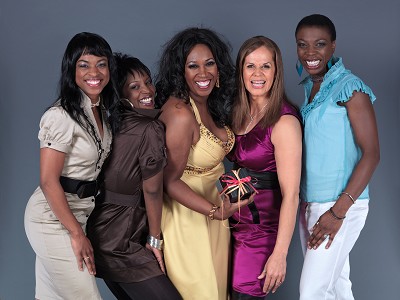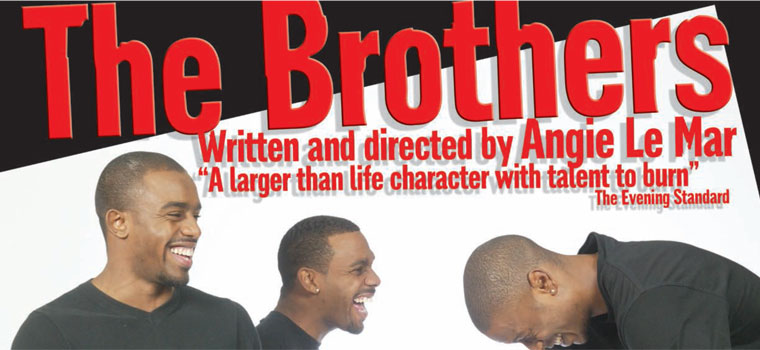She is undoubtedly one of the best loved comediennes in Britain! The award-winning Angie Le Mar is a TV and radio presenter, director, producer, writer, and mum of three.
Over the last 30 years, her presence in iconic productions like The Real McCoy and Get Up, Stand Up cannot be overlooked. Her accolades include being the first ever female Black comedy act to appear at Harlem’s legendary Apollo Theatre and the first to sell out a show in London’s West End!

Melan Magazine: I’m just going to take you back a little bit to what you wanted to be when you were a child?
Angie Le Mar: Well I’ve always known that I was going to make people laugh, I didn’t know what it was called, I didn’t know that there was such a thing called “comedy”, I just knew that when I stood in front of my brothers and my family, mum and dad, I was at peace, I was relaxed, I was happy and it was an enjoyable feeling. I didn’t know that it was even a job until I kind of got a little bit older.
MM: What age was that?
ALM: Probably 11. I was in primary school when I discovered acting lessons and classes, and I thought, if I can do this all my life it’ll be great. Because there’s just something you feel, and sometimes when kids feel something, people stop them and say, “don’t be silly, you’ve got to do things properly and professionally”.
MM: Were you the class clown then?
ALM: Absolutely, I was definitely the class clown but my tomfoolery was really based on lots of different things. It was only when I left school that I was diagnosed with dyslexia. When teachers asked me to read and do stuff like that, my way of getting out of it was to crack jokes and so on. And when you hear laughter, as a comedian, it’s like scoring a goal for footballers, it’s like writing a great song for singers, it soothes the soul, that’s all I can say.
MM: Just touching on your dyslexia, do you feel it held you back or did it make you more determined to succeed?
ALM: I was diagnosed when I left school. I really feel that it should have been spotted earlier, and I wouldn’t have felt stupid and like I couldn’t do things. But once I found out what it was, I was like, ‘well that makes complete sense’! Because I didn’t feel dumb, I only felt stupid when I was reading aloud, but when I was in my brain I thought, well I know the answers. I didn’t know what my teachers were talking about but I could read, I just couldn’t read aloud. Even after I was diagnosed I still kept it to myself, but then when I discovered that Whoopi Goldberg was dyslexic I told my friends omg I’m dyslexic like it’s a cool thing now. “We’re both dyslexic and my God the struggle that we have, me and Whoopi”. I found out that 49% of entrepreneurs are dyslexic, it’s quite cool to be dyslexic actually.

MM: How does it feel to be called a pioneer of Black British Comedy?
ALM: Today when I hear that I kind of go “Hmm yeah…, that’s cool”, but at the time, you don’t know do you? It’s like when you look back at your pictures and say, gosh, “I was always slim, what was I worried about?”. Thirty years down the line you can see that it really was pioneering. We kind of just threw ourselves out there. I’ve always been quite reckless and radical, never really cared about what people said and I thought “why am I like this” but I’m glad I’m like that. However, I probably changed in my 30s when I started to behave myself and I realised the misbehaviour thing doesn’t work. But to be described as a pioneer now, it feels really solid, it feels historical, it’s going down in history. You know when I’m gone, and they go into Google, that’s what they’re going to come up with.
MM: Would you name check some of your greatest moments on TV and comedy?
ALM: I think for me it’s really when I was the first black female comedian to go out to do a sell out one woman show, and to work in America and to do the Apollo, to just kind of create theatre that was ground breaking. I remember watching French and Saunders on television, in fact I remember seeing them and other big names at the BBC sitting around the table and I thought, hmm, so “you all know each other!” and that’s when I thought “conspiracy”! When I wrote Funny Black Woman I wanted to write a show for funny black women on the edge, so that we could be funny, cool, glamorous, sexy, edgy, all those things rather than playing that role in The Bill as social workers. That there was my most pivotal point in my career, because it gave me permission to accept that I was a writer, and it gave me permission to understand the power of the pen and also employment. And understand that you can employ people and pay them and they could be your friends, and you could build something and you could have company at the top, because anybody who wants to be up there by themselves is a liar.
MM: Do you still get nervous when you’re about to go on stage to perform?
ALM: Always! Until I get the first laugh, I question myself, what makes me do it, why can’t I get a 9-5 and do normal things. I always have nerves, if I don’t, I’d be worried, but it’s manageable nerves. If I’ve done my preparation, it’s kind of exciting. I’m 52 this year and it’s still not going away.

MM: What do you think of sort of representation in the media nowadays? Do you think things are getting better?
ALM: No, it’s absolutely worse. I think we’re at an all-time low. And I think that people are a bit deluded when they think that diversity is going to carry us through. I think that when people have to start being told to be inclusive, what’s the point?
My brother always told me your heart and your mind act from two different places. I think we’re forever telling the media to make a heart decision? We only come through after we’re done marching and petitioning and [they] think “oh right, them” and once they’ve done their bit they take it back and we start the same cycle over again. I think we need to wake up.
MM: So, what’s the solution, what do we need to do?
ALM: We need to start to recognise that the media is not controlled by us. We need to start our own production teams. In truth, Netflix and YouTube are controlling the media right now, not BBC or ITV. That’s where we need to focus on. When I was growing up, I thought only white women had breast cancer because that’s the poster that they gave us. You look at Loose Women now, you look at morning TV, we’re not there! How can we not be there when we’ve got all these Brenda Emmanus’s just doing news, not taking it from them but we’re supposed to be producers running that now. I think that some of our black sisters need to get together and understand “Listen, when you go in, don’t shut the door. Don’t think you’re the only one there, so be happy in there because when they start screaming at you, guess who you’re going to need to call?” Your sisters. My first audience is black women. If the black women are not happy with my material, trust me I’m rethinking it. If the place is packed with black women, I’m good! What happens is people so want to be appreciated and taken in, that they kind of sell a little bit of their soul. We need to join forces. Let’s go on social media and deal with the way they’re talking about Diane Abbott. Yes, she made a mistake but she didn’t kill anyone. And her thirty years of good work isn’t going to be thrown under the bus just because she said 30 million or 80 million!
MM: What’s a career highlight for you?
ALM: It was sitting down with Whoopi Goldberg. I hosted a radio programme on BBC London and she was coming out with her book which is called “Book”! They gave me 10 minutes with her. So, I was going to make the most of that 10 minutes, I got film crew in there, I got everything. That 10 minutes turned into an hour and 45 minutes! We just talked and talked, she was telling me who she was and what it was like for her, and how she became who she is and how she is under no pressure to prove to anyone. What she gave me was just second to none. Afterwards, I wrote her a poem and framed it and said to her “When I found out that you were dyslexic, it opened up so much for me, because my idol had something that I had been struggling with”. And I gave her the poem and she held it and she got quite emotional and just said “Thank you doll, thank you doll”. And her agent is looking at her like “What’s going on?” and she just completely blanked them and she said, “I’m talking to Angie, I’m talking to Angie”. I learned from our American sisters, they have their stuff but they kind of come together when it matters, and we don’t do it enough. No one can say anything to me about Whoopi Goldberg. If she hit my mum I would say, “Well my mum shouldn’t have been standing there”!

MM: What’s the one motto that you live by?
ALM: Definitely “What the mind can conceive, the man can achieve”. My brother gave me that when I was young, and I kept turning it over in my head and saying “if I can conceive it, then I can achieve it. So that means that my brain has already told my body that I can do it”. And that scared me because I used to think of things and I was like “oh no, I thought of it, I’ve got to make it happen”! So that kind of fuelled a lot of creation in me because I’d go “wouldn’t it be great to see a black woman on stage, all funny and just vibrant” and then I’d go “oh my God, I’ve got to write it”, and I did. Wouldn’t it be great to see black guys in a play that is really cool, sexy and then I wrote The Brothers. Everything I conceived in my head, I ended up achieving. The only time that didn’t work for me is the weight loss! I’ve been thinking about it, I’ve been trying, but it won’t work. I guess we just have to let that one go!












